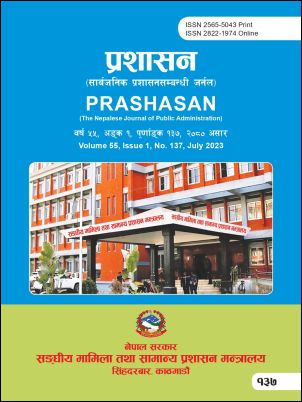New Public Management Reform: Implementation Experiences of Developing Countries and Nepal
DOI:
https://doi.org/10.3126/prashasan.v55i1.56440Keywords:
NPM Reforms, public sector, practical challenges, developing countries, NepalAbstract
This article examines the practical experiences of developing countries and Nepal regarding new public management (NPM) reforms. This article employed the descriptive research design based on the systematic literature review using almost 50 articles for the analysis; the study aims to understand the extent of NPM adoptions. While many developing countries have partially embraced NPM principles, full implementation remains a challenge. NPM has portrayed public managers as business-like owners of a leaner, more privatized government, incorporating corporate methods and principles. However, the argument suggests that NPM may not be appropriate for developing nations due to issues like corruption and administrative incompetence. NPM initiatives in the underdeveloped world have resulted in both successes and failures, influenced by localized contextual factors rather than national capabilities. The circumstances should guide reformers, urging open-mindedness towards effective strategies. Since the 1960s, Nepal has pursued public administration strengthening efforts, adopting NPM-related reform principles after 1990. Despite good intentions, NPM-based reforms have not brought significant improvements to Nepalese public administration. The article also focuses on how Nepal's political environment, path-dependency traits, and bureaucratic behavior have influenced the implementation of NPM-oriented reforms.
Downloads
Downloads
Published
How to Cite
Issue
Section
License
- The copyright of published materials of the journal remains with Ministry of Federal Affairs and General Administration.
- The published article cannot be reproduced or copied commercially by any person or institution but it can be used non-commercially for academic, research and training purpose providing proper citation is given.




